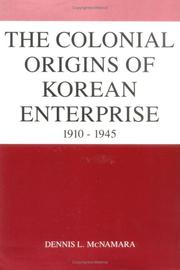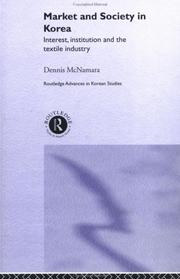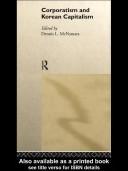| Listing 1 - 7 of 7 |
Sort by
|

ISBN: 0521385652 0521032083 0511528108 Year: 1990 Publisher: Cambridge [England] New York Sydney Cambridge University Press
Abstract | Keywords | Export | Availability | Bookmark
 Loading...
Loading...Choose an application
- Reference Manager
- EndNote
- RefWorks (Direct export to RefWorks)
South Korean conglomerates, or 'chaebol,' such as Hyundai and Samsung, play a far more important role in the Korean economy than do comparable large firms in the US and Japanese economies. Despite the importance of the chaebol to the rapid postwar development of the Korean economy, little has been written about their origins during the Japanese occupation. Through case studies of local ownership in major financial, commercial, and industrial ventures, this book provides a detailed picture of indigenous capitalism during Japanese colonization. Drawing on Japanese government sources, Korean biographies and diaries, interviews and US intelligence material, the author gives a compelling account of key personalities in the Korean business elite and of the personal dilemmas of balancing nationalism against success under dependent, colonial conditions. The author concludes that dependent rather than comprador capitalism characterized leading Korean businesses through 1945. Patterns of concentration within family enterprises, close ties with the colonial state, and mutual support among a Korean inner circle of business leaders constitute a legacy of the colonial period important to the subsequent development of Korean conglomerates.
History of Asia --- anno 1900-1999 --- South Korea --- Corporations --- -K9400.70 --- K9410 --- K9170 --- Business corporations --- C corporations --- Corporations, Business --- Corporations, Public --- Limited companies --- Publicly held corporations --- Publicly traded corporations --- Public limited companies --- Stock corporations --- Subchapter C corporations --- Business enterprises --- Corporate power --- Disincorporation --- Stocks --- Trusts, Industrial --- History --- -Korea: Economy and industry -- history -- Japanese annexation period (1905-1945) --- Korea: Economy and industry -- organization and systems --- Korea: History -- Japanese annexation period (1905-1945) --- Korea --- Economic conditions --- -History --- -Corporations --- -History of Asia --- K9400.70 --- Korea: Economy and industry -- history -- Japanese annexation period (1905-1945) --- Japan --- Korea [South ] --- 20th century --- 1910-1945 --- Japanese occupation, 1910-1945 --- Corporations - Korea (South) - History - 20th century. --- Korea - Economic conditions - 1910-1945. --- Korea - History - Japanese occupation, 1910-1945. --- Social Sciences --- Political Science

ISBN: 0415274818 0203378431 1134478356 1280073314 0203361652 9780415274814 9780203361658 9786610073313 6610073317 9781134478309 9781134478347 9781134478354 Year: 2002 Publisher: London ; New York : Routledge,
Abstract | Keywords | Export | Availability | Bookmark
 Loading...
Loading...Choose an application
- Reference Manager
- EndNote
- RefWorks (Direct export to RefWorks)
Assessing the roles of capital, labour, and state, McNamara discovers a distinctive style of interest bargaining to bridge uncertainties and foster entrepreneurship. The textile industry serves as a microcosm of the broader social changes of the past five decades. Dramatic transitions from family firms to professional capitalism, from state direction to regulation, and from company unions to industry federations take centre stage. Moving among executives, labour leaders, and state officials, the author charts development across the crucible of contending interests. Stretching from high technol
Textile industry --- -K9436 --- K9400.80 --- Textile industry and fabrics --- Textiles industry --- Manufacturing industries --- Korea: Economy and industry -- textile and leather industries --- Korea: Economy and industry -- history -- modern period, postwar period (1945- ) --- Korea (South) --- -Economic conditions --- -Textile industry --- Economic conditions --- K9436
Book
ISBN: 9780367319175 0367319179 9780813336305 0813336309 Year: 2018 Publisher: New York Routledge
Abstract | Keywords | Export | Availability | Bookmark
 Loading...
Loading...Choose an application
- Reference Manager
- EndNote
- RefWorks (Direct export to RefWorks)
Korea --- Commerce --- History --- Economic conditions
Book
ISBN: 9781501744655 Year: 2019 Publisher: Ithaca, NY
Abstract | Keywords | Export | Availability | Bookmark
 Loading...
Loading...Choose an application
- Reference Manager
- EndNote
- RefWorks (Direct export to RefWorks)
Multi
ISBN: 9781501744655 Year: 2019 Publisher: Ithaca, N.Y. Cornell University Press
Abstract | Keywords | Export | Availability | Bookmark
 Loading...
Loading...Choose an application
- Reference Manager
- EndNote
- RefWorks (Direct export to RefWorks)

ISBN: 9780511528101 9780521385657 9780521032087 Year: 1990 Publisher: Cambridge Cambridge University Press
Abstract | Keywords | Export | Availability | Bookmark
 Loading...
Loading...Choose an application
- Reference Manager
- EndNote
- RefWorks (Direct export to RefWorks)

ISBN: 1134636903 1280333359 9786610333356 0203257995 0203021878 0415200520 9780203257999 9780415200523 9780203021873 9781134636853 9781134636891 9781134636907 Year: 2002 Publisher: London ; New York : Routledge,
Abstract | Keywords | Export | Availability | Bookmark
 Loading...
Loading...Choose an application
- Reference Manager
- EndNote
- RefWorks (Direct export to RefWorks)
Corporatism and Korean Capitalism employs corporatist theory to examine the Korean experience of state-business ties. It includes theoretical chapters on Asian and Korean corporatism, case studies of agriculture, industry and industrial relations and an introduction to comparative corporatism. It helps to push the study of Korean political and economic change from description on to theoretical analysis.This volume will challenge researchers and students of Asian studies, economics and politics to extend and refine their understanding of both corporatism and Korea. Moreover, this
Industrial policy --- Corporate state --- Capitalism --- Korea --- Politics and government. --- Market economy --- Corporations (Corporate state) --- Corporatism --- Corporative state --- Corporativism --- State, Corporate --- -Corporate state --- -K9409 --- K9410 --- K9401.10 --- K9413.10 --- Korea: Economy and industry -- organization and systems --- Korea: Economy and industry -- policy, legislation, guidelines, codes of behavior --- Korea: Economy and industry -- relations -- state --- Economics --- Profit --- Capital --- Political science --- Syndicalism --- Fascism --- Functional representation --- K9409 --- Korea: Economy and industry -- theory, methodology and philosophy
| Listing 1 - 7 of 7 |
Sort by
|

 Search
Search Feedback
Feedback About UniCat
About UniCat  Help
Help News
News